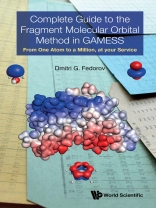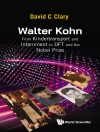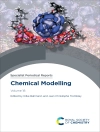The fragment molecular orbital (FMO) method is a fast linear-scaling quantum-mechanical method employed by chemists and physicists all over the world. It provides a wealth of properties of fragments from quantum-chemical calculations, a bottomless treasure pit for data mining and machine learning. However, there is no user-friendly description of its usage in the widely employed quantum-chemical open-source software GAMESS, nor is there any book covering the usage of GAMESS in general. This leaves very many interested users to their own devices to get through a variety of problems with very cryptic descriptions of keywords in the program manual and no guide whatsoever as to what options should be set for particular scientific tasks. This book is the panacea to many frustrations.
The main focus of the book is to build a solid bridge connecting FMO users to GAMESS, by giving a helpful introduction of various FMO methods as needed for particular problems found in computational chemistry, and describing in detail how to do these simulations and understand the results from the output of the program. The book also covers parallelization strategies for attaining high parallel efficiency in massively parallel computations, and provides means to analyze performance and design a solution for overcoming performance bottlenecks. A special section is devoted to dealing with problems in executing GAMESS, arising from computational environment and user errors. Finally, 14 carefully selected types of applications are discussed in detail, describing the input keywords and explaining where to find the main results in the text-based output.
Contents:
- Introduction
- Getting Started:
- Practical Summary of FMO
- Installation of GAMESS
- Understanding Parallel Execution
- How to Run GAMESS
- General Structure of GAMESS Input Files
- FMO Input Files
- FMO Result Files (LOG, DAT, TRJ, RST, and F40)
- How to Begin Your Own FMO Calculations
- Parallelization Strategy
- Basic FMO Calculations:
- Treating Solvent
- Desolvation Penalty in Binding (SBA)
- Solvent Screening
- Polarization, Interaction, and Binding Energies
- Analyses for FMO
- Periodic Boundary Conditions (PBC)
- Geometry Optimizations
- Molecular Dynamics (MD)
- Hessians, IR and Raman Spectra
- Chemical Reactions
- Atomic Charges, Multipole Moments, and Spin Populations
- Building up Complexity:
- Parametrized Methods
- Unrestricted (UHF and UDFT) and Open-shell (ROHF) Methods
- Electron Correlation
- Multiconfigurational Self-consistent Field (MCSCF)
- Electronic Excited States
- Multiple Layers
- Frozen Domain (FD)
- Molecular Orbitals and Their Energies (LCMO)
- Properties on a Grid
- Struggling with Convergence
- Fragmentation
- Advanced Techniques:
- How to Compute Polarization Energies
- Embedding Types
- Diffuse Basis Sets
- Dual Basis Sets (AP)
- Restarting Jobs
- Using FMO for Non-FMO Tasks
- Temperature, Entropy, and Free Energy
- Acceleration Tricks
- How to Calculate Millions of Atoms
- Improving GDDI Performance
- Reference Materials:
- Conclusions and Outlook
- Troubleshooting
- Collection of Sample Input and Output Files
- Processing Results
- GAMElish Dictionary
- Suggestions for Further Reading
Readership: Research groups in the fundamental fields of computational chemistry, biology, physics and applied fields of catalysis, drug discovery, materials science, both in academia and in industry. Courses on computational chemistry/biochemistry/physics (can be used as reference textbook). Developers of theoretical methods and related scientific software.
‘It is rather timely to have a rigorous but user-oriented and accessible book for the fragment molecular orbital. The implementation within GAMESS with a clear description of how to invoke FMO options, practical tips on how to apply these, and concrete examples will be of great practical value in addressing computational materials problems in biology, chemistry, and physics. A comprehensive treatment of both fundamental and practical concerns in FMO are included: the use of various levels of quantum chemical theory within FMO, PIEDA, segmentation and fragmentation, effective potentials and grids, and massively scaling up the calculation size.’ – Kang Hway Chuan Associate Professor of Chemistry, National University of Singapore
‘Dr Fedorov is one of the leading developers of both FMO and GAMESS. I have been a user of GAMESS for many years and find that the existing manual is very hard to read for common users. This book can provide necessary information for many users of FMO in particular and GAMESS in general.’ – Alexander Heifetz Senior Principal Scientist, Evotec, UK
‘As an avid user of the FMO method, I very much welcome this publication, penned by one of the most active FMO developers for GAMESS. It combines theoretical basis and program implementations. It should serve well both as a ‘cook book’ and a comprehensive source of reference for researchers and students alike.’ – Vladimir Sládek Senior Researcher, Slovak Academy of Sciences, Slovakia
Key Features:
- First book covering usage of FMO in GAMESS
- Unique up-to-date textbook on rapidly developing FMO methods
- Written from a user perspective, includes troubleshooting common problems encountered
- Point-by-point layman description of technical keywords
- Deep analysis of performance issues arising from the coarse-grained use of CPUs in massively parallel calculations
- Supplementary material containing a collection of input and output files for GAMESS to assist readers in reading the book is provided online












